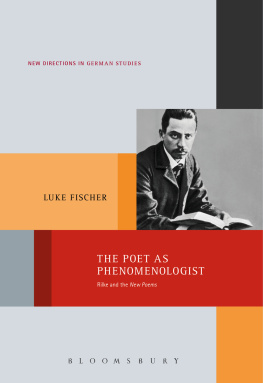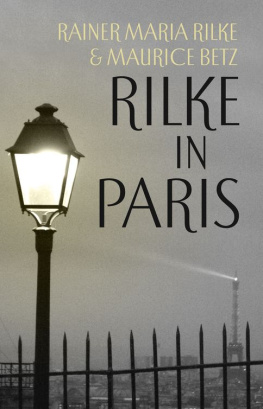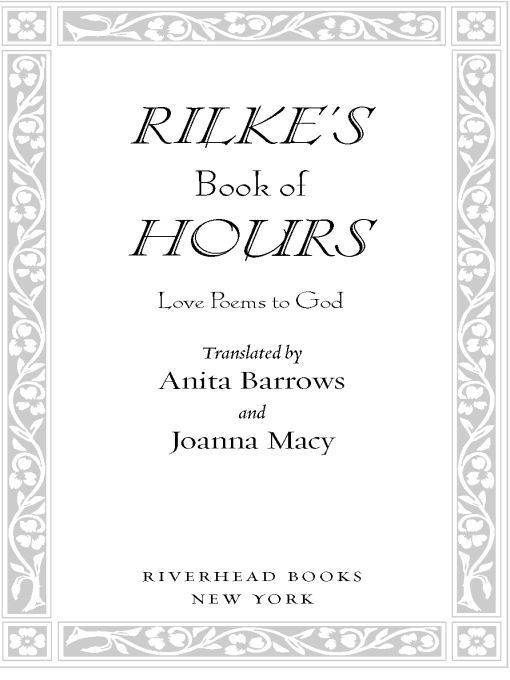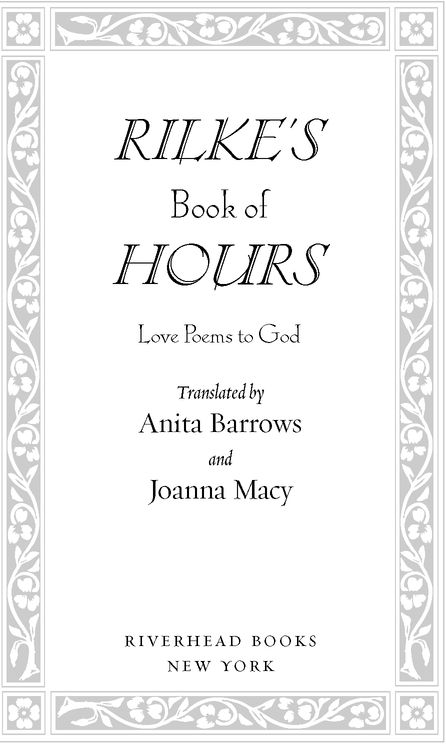Table of Contents
ALSO TRANSLATED BY THE AUTHORS
IN PRAISE OF MORTALITY:
Selections from Rainer Maria Rilkes Duino Elegies
and Sonnets to Orpheus
I am the one whose praise echoes on high.
I adorn all the earth.
I am the breeze that nurtures all things green.
I encourage blossoms to flourish with ripening fruits.
I am led by the spirit to feed the purest streams.
I am the rain coming from the dew
that causes the grasses to laugh with the joy of life.
I am the yearning for good.
HILDEGARD VON BINGEN
Acknowledgments
This new, expanded edition of Rilkes Book of Hours carries our wholehearted thanks to the many people who, over the last ten years, have loved these poems and taken them into their lives. Cherishing these poems as we do, nothing could be more gratifying to us than to have our rendering of them so widely welcomed and used. They have been spoken and sung in weddings and funerals, political gatherings and environmental actions. To our delight they have inspired composers, choreographers, and filmmakers. And now they have inspired this centenary publication, which happily includes the German originals.
Preface
JOANNA MACY
For almost fifty years, since the winters day I found it on a table in a Munich bookstore, Rainer Maria Rilkes Book of Hours has been a cherished companion. My book is the original Insel Verlag edition, clothbound, with Gothic script on soft rag paper, and on the cover the print of the three-jetted fountain the poet had chosen. This pocket-size volume has traveled with me across the spiritual landscapes of my lifefrom the rubble of a once-sturdy faith in church and God, into the streets of political activism, and into the Buddha-fields of South and Central Asia.
The first poem I recall reading was as exhilarating to me as the fresh cold alpine wind off the slopes I loved to ski:
I live my life in widening circles
that reach out across the world.
I may not ever complete the last one,
but I give myself to it.
I circle around God, that primordial tower.
I have been circling for thousands of years,
and I still dont know: am I a falcon,
a storm, or a great song? [I, 2]
I felt a sense of release, as if I had been let out of a cage I had not known I was in. Rilkes images lent some pattern, even meaning, to a life I thought had failed in its spiritual vocation. Once I had imagined that my journey would be like the Pilgrims Progress, where each adventure brings the hero closer to the heavenly city, but the Christian God with whom I had been intoxicated in my teenage years did not survive the theological studies I undertook to serve him (and it was a him). When I turned outward, angry and heartsick, to political affairs, I found that I was a failure as an atheist, too, for I could not cure myself of praying to a God I no longer believed in.
Now those same lines, read for the first time on a snow-packed Munich street, shed a new light on the patchwork my life had becomemarriage, motherhood, abandoned government career, assortment of jobs, studies in art and language. Perhaps, after all, some unknowable center held me in orbit. Rilke reminded me that if my spiritual appetite was greater than the tedious, cramped theorizing of the theologians, so was God. I could almost feel again the sense of belonging and purpose that I thought I had forfeited.
The Book of Hours came with me to Asia, eight years later, when I went to live in India with my young family and the Peace Corps. There, through work with Tibetan refugees, Buddhism entered my life and brought a sense of ease and strength in the patterns it revealed for structuring experiencepatterns that seemed familiar. Rilke, in The Book of Hours, had expressed the sacred in terms and images I now found central to Buddhist teachings, concepts such as law and way (du sanftestes Gesetz... ) and images of wheel and net (You are a wheel at which I stand; you dark net threading through us).
When I first undertook meditative practice, I did not feel a divine presence, an encompassing Other to be held and supported by, which seemed to be there for the young Rilke.
Dont you sense me, ready to break
into being at your touch? [I, 19]
But gradually over time, as the mind relaxed, capacities bred by my earlier Christian experience resurfaced and infused my understanding of Buddhism. The presence that I became aware of, around and within me, is apprehended through an act of rapt, wordless attention, receptive and probing. And what the presence seems to be is the web itself, the thrumming relationality of all things.
Rilkes recognition of the reciprocal nature of our relationship with God, and even with life, is itself a poetic and profoundly personal complement to the Buddhas central doctrine of dependent co-arising. Asserting the radical interdependence at the core of existence, this teaching seemed to me at times a bit abstract, so I loved reading again: What will you do, God, when I die? (I, 36).
This sense of reciprocity nourished my engagement in work for social change, and was fed by it in turn. There came a time in the middle and late 1970s when the enormity of what I was discovering as an environmental activistespecially about the widespread, long-term, devastating effects of nuclear weapons productionbroke through my defenses. I struggled simply to take in what was happening to our world, and to sustain the gaze long enough to be of use. Rilkes unwhining acceptance of the fact that, yes, a world can die, strengthened me in its straightforwardness and lack of self-pity.
I found that many of my colleagues and fellow citizens were silently suffering and suppressing a similar anguish. Buddhist teachings and my Judeo-Christian roots helped me understand this pain for the world. Rilke helped, too.
You are not surprised at the force of the stormyou have seen it growing....
Now you must go out into your heart
as onto a vast plain. Now
the immense loneliness begins....
Through the empty branches the sky remains.
It is what you have. [II, 1]
Those lines murmured like mantras in my mind. I felt Rilke helping me face this time of terror and promise, as I moved out into the public arena with a form of group work based explicitly on the extent and depth of our social despair.
Lord, the great cities are lost and rotting.
Their time is running out. [III, 4]
The work I found myself doing helped people overcome denial about the condition of our world. It taught me that understanding our despair, and not shrinking from it, transforms it into strong, connective energy.
That your world is in agony is no reason to turn your back on it, or to try to escape into private spiritual pursuits. Rilke reminded me that I had the strength and courage to walk out into the world as into my own heart, and to love the things / as no one has thought to love them (I, 61).
My own stubborn, wild love for the world was summoned, and I learned to recognize it in others, too, in the movements for peace, global justice, and ecological sanity. Rilke confirmed my sense of a deep passion at the core of life itself, which I could come home to, the way sheep come home at nightfall, the dark bridge thudding (I, 40). I could die into that passion, as into a lovers arms, trusting its ongoingness and its vast sufficient intelligence.








